The state of my world
Orlando Diary
26 And God said, Let us make man in our image, after our likeness: and let them have dominion over the fish of the sea, and over the fowl of the air, and over the cattle, and over all the earth, and over every creeping thing that creepeth upon the earth. 27 So God created man in his own image, in the image of God created he him; male and female created he them. 28 And God blessed them, and God said unto them, Be fruitful, and multiply, and replenish the earth, and subdue it: and have dominion over the fish of the sea, and over the fowl of the air, and over every living thing that moveth upon the earth.
KJV, Genesis 1, verses 26-28
Since April 22nd I have been watching with a a growing sense of horror as Transocean's Deepwater Horizon exploded, sank, and left a well spewing millions of barrels of raw crude into the Gulf. The disaster has been a constant part of CNN, with a live link to the spewing well place on CNN's front page since late April. It's just been within the last 72 hours that BP finally placed a cap on the blown well. While the flow of oil has stopped for the moment, many of the scientists were confused and concerned over the lower-than-expected well head pressure they found. Some feared that there was a leak elsewhere, while others speculated that so much oil had been released since the April explosion that the pressure was lower than expected. Either case is nothing to be relieved over; both indicate ongoing environment damage in the Gulf for years, if not decades, to come.
This isn't the first time we've had a well explosion in US coastal waters. I'm old enough to remember the Santa Barbara blowout and oil spill, and the subsequent environmental disaster. The amount of environmental damage Santa Barbara caused led to a ban on offshore drilling in California waters and helped kick-start the Environmental Protection Agency. Compared to the Gulf spill, it was minute, with an estimated spill of only 100,000 gallons. Then there was the Pemex-operated Ixtoc I offshore well in Mexico's Campeche Bay that blew out 10 years later in 1979. For nine months the Ixtoc I spilled over 3.5 million barrels of oil into the Gulf before it was finally stopped. As bad as the Deepwateer Horizon may be, the Ixtoc I may still have the dubious honor of being the largest disaster in the Gulf.
But these disasters aren't limited to our waters. During the first Gulf War in 1991, Iraqi forces opened and spilled over 12 million barrels of oil as well as igniting many of the wells in a horrific scorched-earth policy that blights the region to this day. It's been reported that Nigeria, from which we get 40% of our oil, spills more oil into the Niger Delta every year than was spilled by the Exxon Valdez.
Add to that the Great Pacific Garbage Patch, which has grown to twice the size of Texas, and you wonder what part of the admonition in Genesis "replenish the earth" we don't get as a species. Even if you're an atheist, the idea of being better stewards of the earth is an idea that transcends religion.
And then there's the ongoing destruction of habitat much closer to home. I end with these few, brief images of a much larger destruction, all in the name of progress.
26 And God said, Let us make man in our image, after our likeness: and let them have dominion over the fish of the sea, and over the fowl of the air, and over the cattle, and over all the earth, and over every creeping thing that creepeth upon the earth. 27 So God created man in his own image, in the image of God created he him; male and female created he them. 28 And God blessed them, and God said unto them, Be fruitful, and multiply, and replenish the earth, and subdue it: and have dominion over the fish of the sea, and over the fowl of the air, and over every living thing that moveth upon the earth.
KJV, Genesis 1, verses 26-28
Since April 22nd I have been watching with a a growing sense of horror as Transocean's Deepwater Horizon exploded, sank, and left a well spewing millions of barrels of raw crude into the Gulf. The disaster has been a constant part of CNN, with a live link to the spewing well place on CNN's front page since late April. It's just been within the last 72 hours that BP finally placed a cap on the blown well. While the flow of oil has stopped for the moment, many of the scientists were confused and concerned over the lower-than-expected well head pressure they found. Some feared that there was a leak elsewhere, while others speculated that so much oil had been released since the April explosion that the pressure was lower than expected. Either case is nothing to be relieved over; both indicate ongoing environment damage in the Gulf for years, if not decades, to come.
This isn't the first time we've had a well explosion in US coastal waters. I'm old enough to remember the Santa Barbara blowout and oil spill, and the subsequent environmental disaster. The amount of environmental damage Santa Barbara caused led to a ban on offshore drilling in California waters and helped kick-start the Environmental Protection Agency. Compared to the Gulf spill, it was minute, with an estimated spill of only 100,000 gallons. Then there was the Pemex-operated Ixtoc I offshore well in Mexico's Campeche Bay that blew out 10 years later in 1979. For nine months the Ixtoc I spilled over 3.5 million barrels of oil into the Gulf before it was finally stopped. As bad as the Deepwateer Horizon may be, the Ixtoc I may still have the dubious honor of being the largest disaster in the Gulf.
But these disasters aren't limited to our waters. During the first Gulf War in 1991, Iraqi forces opened and spilled over 12 million barrels of oil as well as igniting many of the wells in a horrific scorched-earth policy that blights the region to this day. It's been reported that Nigeria, from which we get 40% of our oil, spills more oil into the Niger Delta every year than was spilled by the Exxon Valdez.
Add to that the Great Pacific Garbage Patch, which has grown to twice the size of Texas, and you wonder what part of the admonition in Genesis "replenish the earth" we don't get as a species. Even if you're an atheist, the idea of being better stewards of the earth is an idea that transcends religion.
And then there's the ongoing destruction of habitat much closer to home. I end with these few, brief images of a much larger destruction, all in the name of progress.
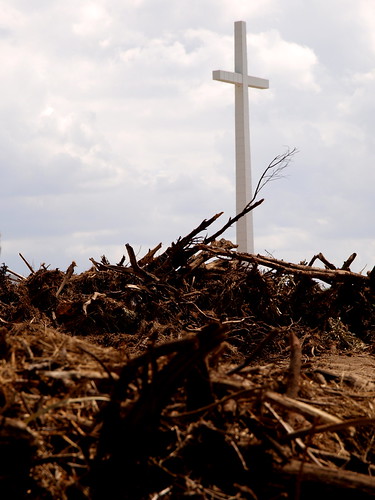
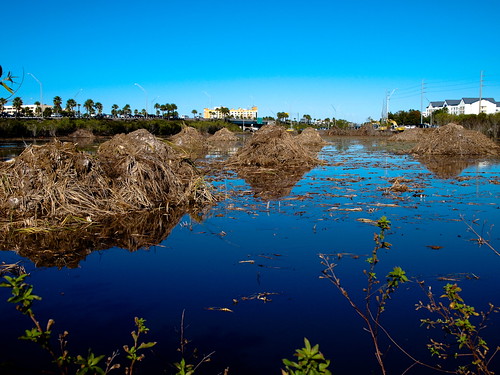
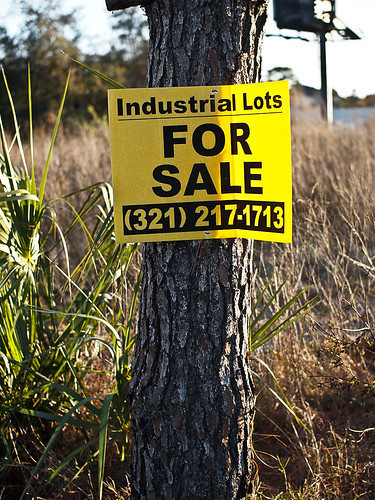
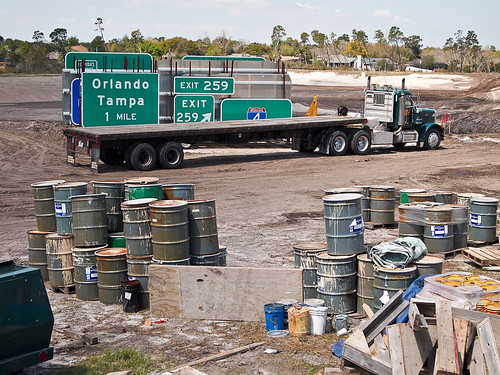

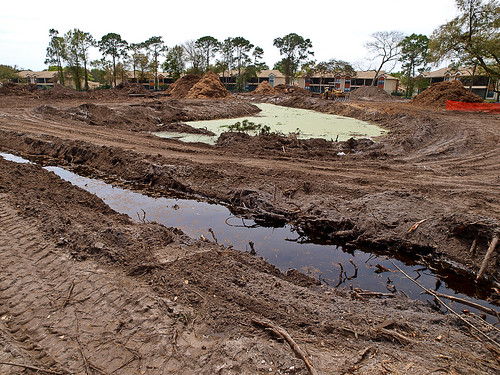



Comments
Post a Comment
All comments are checked. Comment SPAM will be blocked and deleted.